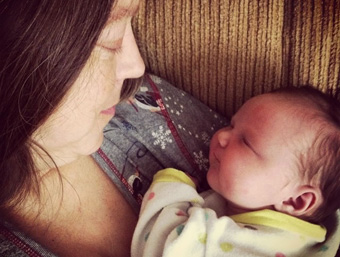 When most women are done having kids they usually want their tubes tied. Medical research has shown that 1 out of every 3 women will change their mind after having their tubes tied and will seriously regret their decision.
When most women are done having kids they usually want their tubes tied. Medical research has shown that 1 out of every 3 women will change their mind after having their tubes tied and will seriously regret their decision.
If you don’t believe these statistics then ask ten of your friends if they every regretted their tubal ligation and see what they say.
Most women will not do anything about their regret except suffer in silence.
Some will seek ask their doctors about other options to have more children. Unfortunately, almost all doctors will recommend in-vitro fertilization (IVF) as the only option.
Most women are not dumb. Many will ask if tubes can be untied. Those that do their research will find a ton of information about tubal reversal and question why their doctors did not recommend…or at least mention…tubal reversal as a possibility.
Naturally these women will wonder if the surgery really works and can you get pregnant after tubal ligation reversal surgery?
Why Doctors Don’t Recommend Tubal Ligation Reversal Surgery?
Why don’t doctors recommend tubal ligation reversal surgery? The reason is simple…because they have very little knowledge about how modern tubal reversal surgery is performed.
You may not realize this but most health care professionals know very little about reversal surgery. Most doctors don’t recommend tubal reversal surgery because they have no understanding of modern surgical reversal procedures….even infertility experts!
Tubal reversal surgery was more popular in the 1960’ through the 1980’s. During this time there was a lot of research about tubal reversal and many more doctors were trained in the procedures necessary to perform tubal reversal.
In the 1980’s in-vitro fertilization..or IVF… was invented. After the invention of in-vitro fertilization, tubal reversal surgery began to decrease in popularity. Why?
Why Do Doctors Recommend IVF Over Tubal Reversal Surgery?
After IVF was invented, many doctors found it more appealing to learn about newer more scientific IVF treatments and to forget about some of the older, ‘tried is true’ infertility treatments.
 Most infertility doctors found it easier and more financially rewarding to perform IVF in the office rather than have to disrupt their office schedule and go to the hospital to perform a more lengthy tubal reversal surgery.
Most infertility doctors found it easier and more financially rewarding to perform IVF in the office rather than have to disrupt their office schedule and go to the hospital to perform a more lengthy tubal reversal surgery.
Around the time IVF was being developed, health insurance companies gradually became more restrictive about paying for unnecessary medical treatments. Many health insurance companies made the decision they would not pay for fertility treatments for patients….especially when the cause of your infertility was a direct result of a poor decision that you made in the past and now regret.
Essentially many insurance companies were telling their members…it was your mistake now you pay for it!
For many infertility patients the costs of treatments has now became a major factor in deciding on which treatment to go with. Back in the day, hospital procedures were more expensive than they are now…and IVF provided a cheaper alternative to reversal surgery.
In the 1970’s most doctors were performing lengthy tubal reversal surgeries in hospital operating rooms. During this time it was very common for patients to stay in the hospital for an entire week after many surgical procedures. In fact, in the 1970’s they even kept women in the hospital for a full week for an uncomplicated vaginal birth. This was also a time when overnight hospital stays were very expensive…much more expensive than they are now.
Many infertility doctors not only found it easier to do IVF in the office but they also found that it was cheaper to do IVF in the office rather than do tubal reversal in the hospital. Infertility doctors also realized they could focus on IVF and treat all patients…rather than specialize in tubal reversal that only helps women who have had their tubes tied.
Since the 1980’s most infertility doctors only train and specialize in IVF. Since then we have had at least 3 generations of doctors who have had little experience with or knowledge about tubal reversal surgery.
This is why most health care professionals have very little knowledge about tubal reversal surgery.
The fact is that tubal reversal is possible. Simple logic will tell you if tubes can be surgically closed…then there should be no reason why can’t they be surgically opened!
Why Doctors Don’t Tell You More About Tubal Reversal Surgery?
If you have asked your doctor can you get pregnant after tubal ligation reversal surgery and have gotten nothing but negative responses then the following video explains why many doctors are negative towards tubal ligation reversal surgery.
Can You Get Pregnant After Tubal Reversal Surgery?
Tubal reversal surgery can be a better treatment than IVF but only if you see a doctor who specializes in tubal reversal surgery. Why is tubal reversal specialization important?
Affordable. Doctors who specialize exclusively in tubal reversal can usually offer reversal for a more affordable price than IVF treatment.
Doctors who specialize in tubal reversal will often perform the surgery in an outpatient surgical setting. This makes the surgery far more affordable than doctors who only perform the surgery in a hospital setting. If tubal reversal is performed in a hospital…the cost of the surgery can be astronomical. This is not covered by health insurance and most people will be forced to consider IVF.
Dr. Monteith is the Medical Director of A Personal Choice. He performs tubal reversal in his outpatient surgical center and the cost of reversal with Dr Monteith is half the cost of a single IVF treatment.
More information: Cost of tubal reversal surgery
Successful. Doctors who specialize exclusively in tubal reversal can usually offer patients higher success rates than doctors who do not specialize in tubal reversal.

Tubal reversal baby compliments of Dr Monteith
Many infertility doctors advertise tubal reversal on their websites but the reality is that most of these doctors dont do very many reversal surgeries.
Many try to entice the patients into their office and then convince them to do IVF instead. Ultimately many of these doctors will tell patients IVF with them is more affordable and more successful than tubal reversal. These doctors will say IVF is more affordable with them because they only do tubal reversal in a hospital and the surgery will cost 2 to 3 times as much as IVF in the office.
These doctors will also tell patients their success rates with reversal surgery are not that impressive and they obtain better results with IVF treatments.
More information: Success of tubal reversal surgery
Dr. Monteith only specializes in tubal reversal surgery. On average about 2 out of every 3 patients will become pregnant after reversal with Dr. Monteith.
Dr. Monteith can even reverse difficult tubal ligations like Uchida and Irving tubal ligations as well as Essure and Adiana tubal ligation procedures.
Are You A Candidate For Tubal Ligation Reversal Surgery?
The best way to find out if you are a candidate for tubal reversal is to send Dr. Monteith a copy of your tubal ligation operative report for a free review. You should also send a copy of your pathology report. You may not have a pathology report.
Operative report. Every tubal ligation procedure should have an operative report. When a doctor performs any surgical procedure they dictate a detailed description of the procedure. This document is call the operative report.
The operative report usually describes in exact detail what was done during the surgical procedure. This operative report is always stored in your medical records. The best way to get a copy of your tubal ligation operative report is to check with the Medical Records Department in the facility where your tubal ligation was performed. Sometimes your doctor will have a copy of your tubal ligation report in your office chart…but the hospital where your procedure was performed will always have a copy of your tubal ligation operative report.
With modern medical records you may be able to get your tubal ligation operative report by checking your on-line medical records in your personal health portal.
Pathology report. If any tissue is removed from the body in a hospital operating room then that tissue must be sent to a pathologist. The pathologist will then create a detailed report describing the tissue that was examined.
The pathology report is helpful because it lets you know exactly how much of each fallopian tube was cut and removed. This will let Dr. Monteith know if you are a good candidate for tubal reversal surgery.
You will only have a pathology report from your tubal ligation if a piece of your tube was removed during your tubal ligation. Pieces of the tube are only removed during cut or tied tubal ligation procedures. If your doctor burned, clipped, or put a ring on your fallopian tubes then you will not have a pathology report. You will also not have a pathology report if you had the Essure or Adiana devices inserted during your tubal ligation procedure.
Want To See If You Are A Candidate For Tubal Ligation Reversal?
The following video explains how to obtain your operative note and send it to Dr. Monteith for a free review.
Chances of Pregnancy After Tubal Ligation Reversal Surgery
Most women will have good chances of pregnancy after tubal reversal surgery with Dr Monteith.
A single cycle of IVF will provide you with a 30 to 40% chance of pregnancy.
In comparison, tubal reversal can provide a 50% to 70% chance of pregnancy. Not only can tubal reversal provide you with an overall better chance of pregnancy but the surgery can allow you to become pregnant more than once.










